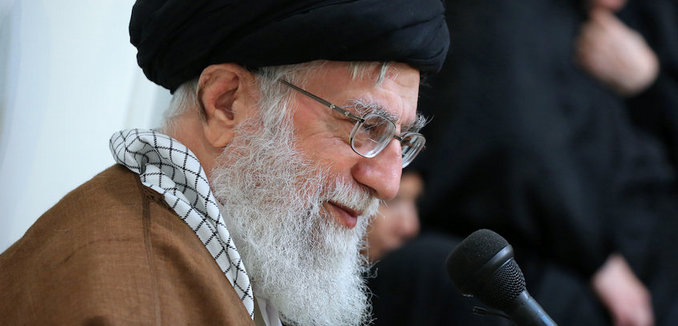A first draft of Iranian Supreme Leader Ayatollah Ali Khamenei’s 50-year plan shows that his goal remains one of “regional, even global, supremacy,” in addition to the Islamization of Iranian culture and the rejection of Western values, an expert on Iran wrote in an analysis published Wednesday.
Though the final plan is not scheduled to be published for several months, Khamenei released the draft to get feedback from both the academic and religious establishments. The reason Khamenei publicized this draft “likely stems from the regime’s desire to project self-confidence about its sustainability,” Mehdi Khalaji, who studied Shiite theology at religious seminaries in Qom, Iran, and currently is a fellow at the Washington Institute for Near East Policy, wrote in his analysis.
The fifty-six specific recommendations which cover “all aspects of Iran’s domestic and foreign affairs” aim to promote Islamization of “all facets of life,” thus rejecting Western values, and developing a high level of scientific achievement to become more self-sufficient.
Iran’s view of the need for technical self-sufficiency is frequently expressed by its leaders with respect to its military buildup. President Hassan Rouhani, on numerous occasions, has said that Iran would refuse any international limits on its ballistic missile development program. Rouhani and others have maintained that developing such weapons is necessary for Iran’s defense.
Khalaji characterizes the plan as “Khamenei’s vision for Iran not only as a nation-state, but as the leader of a ‘new civilization.'” He attributes this to Khamenei’s perception of himself not just as a political or military leader, but as “the country’s supreme ideologue, with absolute authority over the cultural and religious arenas.” Accordingly, Iranian state media often refer to the Supreme Leader as “guardian of the Muslim world.”
Viewing himself in this fashion, Khamenei, since he assumed power in 1989, has transformed “Iran’s central institutions, from revolutionizing the country’s network of religious and civil organizations to remaking the Islamic Revolutionary Guard Corps into a giant multidimensional body and regional force,” Khalaji assessed.
He added that the goal of this transformation was to create an “ideological apparatus” that is able to adopt his policies and resist, what Khamenei called, the West’s “cultural invasion” of the Muslim world.
Ironically, in Khalaji’s assessment, “Khamenei’s blueprint for the next fifty years emphasizes cultural and ideological policies that have repeatedly failed in the past forty years.” He explained that “the Islamization of Iranian life has largely failed in practice,” due to its failure to develop critical sectors of society, such as finance, as well as resistance from society to enforce religious standards. While Iranian authorities have managed to maintain political control through coercion, the “regime has been unable to make citizens submit to its cultural demands.”
“Taken together, the guidelines in Khamenei’s manifesto promise nothing more than relentlessly maintaining the Islamic Republic’s revolutionary character,” Khalaji concluded. “This includes resisting any domestic efforts to reform the regime’s ideological aspirations or, more important, its decisionmaking tendencies.”
[Photo: khamenei.ir ]




